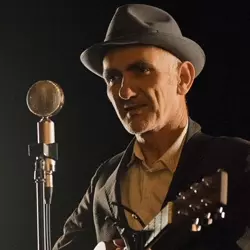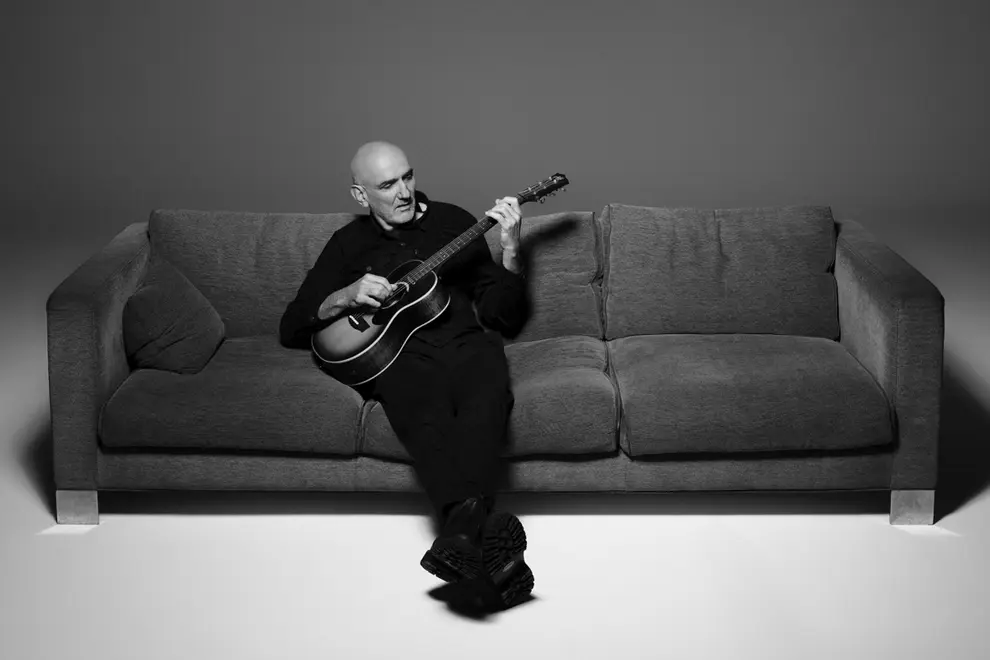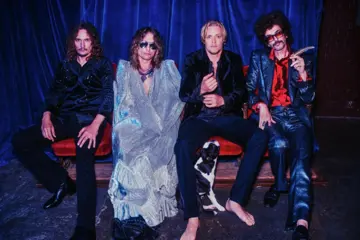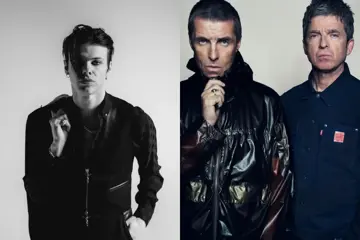 Paul Kelly
Paul KellyIt's a statement that could apply every time we need to buy a new calendar, but it's been a rather big year for Paul Kelly.
In the last few years alone, the venerated musician has wrapped up his biggest tour to date, playing arenas around the country; he's released a sequel to one of Australia's most beloved and resonant songs; he's nabbed a pair of ARIA Award nominations for 2024 record Fever Longing Still; and now, he's released his new album, Seventy.
Speaking to The Music, Kelly concedes that maybe a bit of downtime should finally be on the cards.
"I'm looking forward to – around next May or June – taking a bit of a break," he admits. "It's been a busy time; a couple of records in the last two years and a big tour. And now we've got the Red Hot Summer Tour coming up.
"But that was sort of always the plan, just to get these records out, do a lot of shows, and then take a break for a while."
Put simply, if anyone in the Australian music industry deserves a break, it's Kelly. After all, Seventy marks his 30th studio album in 44 years, and with close to 50 years spent performing around the world, one could forgive him for taking his time to release new music.
As he speaks days out from the album's release, Kelly admits that all these years in the game haven't dampened the level of excitement he feels at sharing a new record with the world.
"I always feel excited," he admits. "This is sort of my favourite part of my job, that little period between the records done and before it comes out. It's like sitting on a secret."
Don't miss a beat with our FREE daily newsletter
That secret, Seventy, is arguably one of the year's finest records. At its core, it's a record based around the importance of storytelling, Kelly's mastery of the concept, and the cultural and societal resonance of such a practice.
Opening and closing with two parts of the track Tell Us A Story, it instantly leans into Kelly's bread and butter as a musician – crafting tales that speak to the heart and soul of its listener. By his own admission though, it's hard to say whether Kelly views himself as more of a musician or a storyteller, first and foremost.
"I'm not a musician like, say, everyone in my band is," he notes. "I wouldn't really be that much good in someone else's band. I'm a pretty basic guitar player, very basic piano player, but I've got a knack for making up melodies.
"So I would call myself a songwriter more than a musician, but broadly, of course I'm a musician. But I'm not really a highly-skilled musician.
"I know a few chords," he laughs, "and it's funny how many songs you can write with the same chord over and over again."
You'd be hard-pressed to find an Australian music fan that would agree that Kelly isn't a highly-skilled musician, however, solely based on the vague definition of terms. But an album like Seventy helps to showcase just how strong his songwriting skills truly are.
Like most songwriters, Kelly admits there's no real code to crack when it comes to the songwriting process – it's all about tackling the opportunity when a song presents itself.
"Writing a song is always uncertain," he explains. "I might be all day trying to write a song, playing around on the guitar or piano and coming up with ideas. And then you don't necessarily get a song – the song always comes at you sort of sideways
"So you've got to be working away at it for that to happen. You've just got to turn up and then hope it happens. It's hard to plan songs, but often the way I do a song is just playing an instrument, playing around, and getting some chords that feel good, but most of the time songwriting is being stuck.
"Nothing much is happening, then every now and then something happens and you think, 'Great, we're off,'" he adds. "Then you're hunting down a song. But it's sort of out of your control."
Across the record's 13 songs, Kelly's songwriting sees him approaching varied topics. There's life, there's death, there's everything in between.
There's the joy of discovery new paths as yet untravelled, a track written to and named for his granddaughter, and there's myriad sources that inform the works, whether it be The Lord Of The Rings, and anthem of French resistance, the Japanese television series Shogun, and a book by Dutch psychiatrist Bessel van der Kolk.
Two songs of note, however, aren't written by Kelly, though their seamless way of fitting into the record underlines his literate and poetic approach to the record.
Those songs – The Magpies, named for a work by New Zealand poet Denis Glover; and Sailing To Byzantium, named for a work by Irish poet W. B. Yeats – use their source material in full and are set to music by Kelly and his band. But what was it about their work that impacted Kelly enough to utilise them for the record?
"I started writing, putting poems to music about 12 years ago and realised this is another way to write songs," he explains. "Especially when you put other people's words to music, because for me, words are the hardest part. So when you've got a set of words that you already think are really good and you put music to it, I mean, half your job's done.
"I find melody and music pretty, pretty easy, but words are always the slowest and hardest part. So to have a great set of lyrics to start with, you're well on the way.
"I've loved a lot of Irish poetry over the years, so Yeats has always been a favourite of mine. Some poems, you look at them straight away and it's like a song lyric. Glover's is very much like a song lyric, especially with the funny little repeating line where he tries to imitate the sound of the magpie; 'Quardle oodle ardle wardle doodle.'
"It was exciting for me when I realised I could start with the words first and write songs because I found a new way to write songs," he adds. "And for any writer who has managed to find a way to break their own habits, it's all you can ask for."
One of the most notable pieces of songwriting on the record comes by way of Rita Wrote A Letter. A sequel to Kelly's enduring classic How To Make Gravy, the song was teased by way of a public notice in the August 11th edition of The Age newspaper in Melbourne which made mention of the passing of Joe, the main character in Kelly’s song.
In How To Make Gravy, Joe writes to his brother, Dan, while incarcerated ahead of the family’s traditional Christmas meal. Joe used to make the gravy for the occasion, but in the song, he makes it in prison. He also asks Dan to look after his wife, Rita, and their children.
If the original bittersweet piece of writing that tugs at the heartstrings of all who have experienced loss and longing during the festive season, surely its embrace by the general public would give Kelly some level of pause when it comes to continuing the story?
"Oh, no, not at all," Kelly says swiftly. "I've been wanting to write one for a long time. About five or six years ago I thought, 'I'd like to write a sequel to that song more from Rita's point of view,' because she just gets a passing mention in the original.
"So I wrote it down, five or six years ago, Rita Wrote A Letter. I just wrote it down in my notebook and thought, 'Well, that's the title. There's a song title right there.' I scratched away, then came back to it over the years. Nothing much happened until my nephew Dan came over the house with that piano riff that became the basis of the song.
"I started singing along to it and then that's when the words came," he adds. "I hadn't realised that I was going to kill Joe off, but the very first lines I wrote were, 'I really don't know how I'm talking/Six feet down under the ground,' and I thought, 'Oh, here we go. Am I really going to follow this up?"
Pairing a level of Shakespearean darkness and light in his writing, the result is a track that does find itself a little more light-hearted than the original presents itself as. Though it's fine to write a sequel to a beloved song, the real test is bringing it to the people.
"We started playing it at the arena shows we did in August and September, and it's been going down really well," he admits. "I did have some apprehension about how people would receive it, because I know a lot of people feel quite attached to the original song, the characters and, I thought people were going to be upset that I've killed Joe off.
"But I can't worry about that. If they get upset, I can't do much about that. And if they don't like it, they don't have to listen to the song. But I sort of realised pretty quickly, 'Well, I haven't really killed Joe off 'cause he doesn't shut up.'
"Rita gets to her side of the story, but it's only in the chorus. Most of the song is Joe talking, and he is still talking as the song fades out. So I haven't really killed Joe off at all – he just keeps on going."
While Seventy itself references the current age of its creator, it's also a full-circle album of sorts. The album cover, shot by Dean Podmore, is an homage to a 1988 Jon Lewis portrait of Kelly, while an upcoming one-off show at Melbourne's Corner Hotel is where Kelly – a regular of the bar at the time – received the inspiration for his hit song Dumb Things.
Though the album has its roots in the past, it still looks forward with ease, capturing Kelly crafting work which, while varied and unique, is wholly representative of the journey he's taken us all on over these past decades.
"I sort of see the record as a bit of a pair with last year's record, Fever Longing Still, which is also very varied," he explains. "I still like the album as a concept, and one of the things I really like about making an album is crafting the sequence and choosing the songs. We've got a diverse group of songs musically, but I always enjoy finding the connections between them and then making an album.
"I understand that people are just going to listen to songs any which way, but I still want to make albums that if people do take the time to listen to in sequence from start to finish, they'll be rewarded in a way that's different from just hearing songs individually.
"We've got the little bookends on this one, Tell Us A Story, and that sort of encompasses all the storytelling within the record," he continues. "There are a lot of songs that connect to each other. Happy Birthday, Ada Mae is sung to a child, and then the last verse mentions a bird, and then the next song is called The Magpie.
"So I'm always trying to make these little connections between the songs, and that's sort of what I'll continue to do."
Paul Kelly’s Seventy is out now. Tickets to his upcoming show at Melbourne’s Corner Hotel are on sale from 11am on Sunday, November 9th.
Paul Kelly – Down On The Corner
Tuesday, November 11th – The Corner Hotel, Melbourne, VIC
This piece of content has been assisted by the Australian Government through Music Australia and Creative Australia, its arts funding and advisory body


















